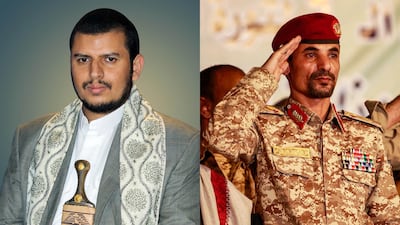Three Houthi commanders will be designated "Global Terrorists" by the outgoing Trump administration on January 19, Washington announced this week.
Notorious for their individual roles in hindering the peace process and choreographing military campaigns and offensives that have resulted in significant civilian loss of life and the targeting of vital institutions in Yemen and Saudi Arabia, the trio was also sanctioned by the UN Security Council after the Houthi takeover of Sanaa in 2014.
US sanctions on Abdulmalik Al Houthi, his brother Abd Al Khaliq Badr Al Din Al Houthi and Abdullah Yahya Al Hakim in conjunction with the UN move cite their use of “violence and other means, [to] undermine the political process in Yemen and obstruct the implementation of its political transition.”
Here is a look at who the three men are, and the roles they played in the Yemeni conflict leading up to their classification as Global Terrorists.
Abdulmalik Al Houthi
Abdulmalik Al Houthi, brother of the Houthi movement's founder Hossein Al Houthi, was a key player in building the movement from a small group of Zaydi sect members to a force that has taken over large parts of Yemen.
Abdulmalik is known for making long-winded speeches that stretch well over an hour, in an unsuccessful attempt to mimic Hezbollah leader Hassan Nasrallah. Experts say Hezbollah is an 'inspiration' to the Houthis.
Under Abdulmalik's guerrilla command, the Houthis overtook Sanaa in 2015, killed on-again-off-again Houthi-allied president Ali Abdullah Saleh and capitalised on Iranian and Iran-backed Hezbollah military know-how that made them the rampantly corrupt and violent group it is today.
Abd Al Khaliq Badr Al Din Al Houthi
Military commander of the Houthi movement, Abd Al Khaliq Badr Al Din Al Houthi was born in 1984 and is known as Abu Younes (father of Younes). He is one of eight brothers including Houthi founder Hossein and current leader Abdulmalik Al Houthi.
He was blacklisted and sanctioned by the UN on November 7, 2014 and by the US the following year.
Rumours of his death in an air strike circulated in January 2020, but remain unsubstantiated.
Forces loyal to the Saudi-led coalition said they had captured the military commander in 2015 but the Houthis did not confirm those claims.
The Yemeni government says Abd Al Khaliq played a pivotal role in the takeover of Sanaa.
The US believes he marshalled Houthi fighters wearing Yemeni military fatigues in deadly attacks on several locations during the siege on Sadah's Dammaj in 2013, blowing up a school for teaching Quran.
He also had a role in moving weapons and allegedly ordering an attack against diplomatic institutions, according to the US state department.
Abdullah Yahya Al Hakim
The US Treasury Department says Al Hakim was “implicated” in the 2015 coup against President Abdrabbu Mansour Hadi.
Washington claims Al Hakim “met with military and security commanders, tribal chieftains and leading partisan figures loyal to former President [Ali Abdullah] Saleh," whose son Ahmed Saleh, is also a Houthi loyalist, and was sanctioned by the US.
He is also known for his role in the takeover of Yemen’s Amran governorate that killed at least 42 people, where he led and made crucial decisions in the conflicts there.
Al Hakim is also responsible for controlling “all routes” in and out of the Houthi-run capital of Sanaa, thereby having a major impact on imports and aid which millions of Yemenis rely on.


